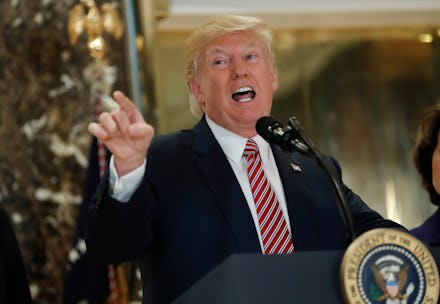Why Trump’s most tumultuous week yet was a big win in the eyes of his core supporters

On Twitter, the Democratic Party was all too happy to put the firing of White House chief strategist Steve Bannon in dire terms. “There’s one less white supremacist in the White House,” the party’s official Twitter account posted, “but that doesn’t change who’s behind the desk.”
The message from the president’s opponents: President Donald Trump may have distanced himself from an alt-right leader by firing his Breitbart-backed chief strategist, but the president’s recent comments came from his mouth, not Bannon’s. And Trump has repeatedly spurned opportunities to articulate more moderate his statements about race.
Those views of race in America — that the claims of minorities could bear equal weight to those of white groups — long espoused by Bannon and defended by Trump earlier this week, are also rooted among the president’s core supporters.
Polling this week showed a stark divide between Republicans and the rest of the country in evaluating Trump’s comments.
A majority of Americans believe Trump has not gone far enough to condemn white supremacist-fueled violence in Charlottesville, Virginia, last weekend. But a majority of Republicans believe what Trump said was strong enough. And approval of his comments runs even higher among those who self-identify as “Trump supporters.”
Another survey found a quarter of all Americans who support Trump say they will never abandon him — including a majority of Republicans. Who are those most hardcore supporters? They were more likely to be female, older than 55, have a high school degree or less and make under $50,000 a year.
Evaluating the attitudes of those communities toward race, ethnicity and immigration shows Trump knows exactly who he is talking to when he blames violence in Charlottesville on “both sides,” defends Confederate monuments and attacks minority-led or progressives activist groups, like Black Lives Matter.
A poll last summer found nearly half of Trump supporters believe black Americans are more “violent” than whites. Only 36% of those voters said they would prefer to live in a community with diverse races. Nearly a third of his supporters also said affirmative action policies “discriminate unfairly against white people.”
Six-in-10 white Republicans said last summer that the national dialogue focuses too much on race. Large majorities of white Republicans also say they reject the notion of “white privilege.”
More specifically to Trump’s current base, white Americans who were older or did not have a college education were more likely to believe race did not factor into their success in life. Small numbers of older or Republican Americans showed any support for the cause of Black Lives Matter.
Trump drew very high levels of support among voters who wanted to see a wall built along the U.S. border with Mexico and believe undocumented immigrants should be deported. His support was also highest among older, whiter and lower-educated Americans, exit polls show.
This paints the picture of a core group of steadfast Trump devotees that does not believe in racial privilege, is opposed to progressive or minority activist groups, is concerned about the impact of immigrants, dismisses the need for a national dialogue about race and in some cases, believes people act differently based on their racial identity.
And it was against that canvass that, on Tuesday, Trump said some of the demonstrators demanding a statue of Robert E. Lee be left standing were “very fine people.” That group, of course, was led by white supremacist, neo-Nazi and Ku Klux Klan-affiliated groups. He also held the “alt-left” partially responsible for violence. Counter-protesters to the white supremacists were largely peaceful locals, college students, progressive activists, Black Lives Matter supporters and clergy.
What Trump said on Tuesday — and what he doubled down on throughout the week — aligns with the existing views of his most ardent supporters. Bannon may be gone, but Trump has signaled he will continue to advance the views of race in America held by his base.